Playwrights Dan Kwong and Ruben Funkahuatl Guevara have quite a tale to tell about post-WWII Little Tokyo and Boyle Heights in Masao And The Bronze Nightingale and an ethnically, culturally, linguistically diverse cast of characters to tell it with, but the World Premiere play-with-songs’ hefty three-hour running time begs the question, how much of a good thing is too much?
Like Guevara’s 2500-word short story of the same name, Masao And The Bronze Nightingale takes us back to the days of zoot suits and bebop, to an America that had only recently released its Japanese-American citizens and their immigrant family members from “War Relocation Centers,” a pleasant-sounding euphemism for what were essentially concentration camps.
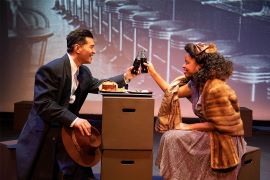 Kwong and Guevara’s play takes as its point of departure one of these native Angelinos, 20something saxophonist Masao Imoto (Michael Sasaki) and an African-American jazz vocalist (Angela Oliver as Charlene Williams) freshly arrived from Kansas.
Kwong and Guevara’s play takes as its point of departure one of these native Angelinos, 20something saxophonist Masao Imoto (Michael Sasaki) and an African-American jazz vocalist (Angela Oliver as Charlene Williams) freshly arrived from Kansas.
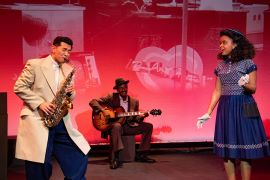 The World Premiere drama offers not only glimpses of racial prejudice against Japanese-Americans (a couple of drunk hecklers take umbrage at having a “Jap” accompanying Charlene on sax) and Masao’s father’s horror at his son dating a kurambo, but also celebrates the overall racial harmony of a community (Boyle Heights) that was one of the few where people of different colors and faiths could purchase a home in L.A.
The World Premiere drama offers not only glimpses of racial prejudice against Japanese-Americans (a couple of drunk hecklers take umbrage at having a “Jap” accompanying Charlene on sax) and Masao’s father’s horror at his son dating a kurambo, but also celebrates the overall racial harmony of a community (Boyle Heights) that was one of the few where people of different colors and faiths could purchase a home in L.A.
Also featured in Guevara’s original short story is Masao’s Chicano bestie Li’l Joe (Isaac Cruz), and their friendship is a highlight of his and Guevara’s much longer stage adaptation, as is Masao’s amusingly eager embrace of all things Mexican.
On a less positive note, a mere two sentences in the much briefer original (“But Masao’s family, were opposed to the relationship and the entire nightclub scene. They wanted Little Tokyo back like it used to be.”) get blown up into multiple scenes featuring Masao’s parents Goro and Yuriko (Greg Watanabe and Sachiyo K.) and Li’l Joe’s folks Valerio and Marina (José A. Garcia and Roberta H. Martinez).
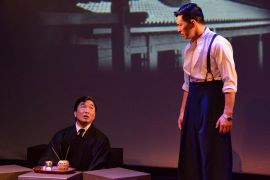 The story’s stage adaptation also adds Masao’s ex-girlfriend’s best friend Junko (Hanna-Lee Sakakibara stepping in as a last-minute sub for Pauline Yasuda), the local Japanese priest (Watanabe), and ten minor featured roles played by Jon Gentry and Scott Golden to an overpopulated mix.
The story’s stage adaptation also adds Masao’s ex-girlfriend’s best friend Junko (Hanna-Lee Sakakibara stepping in as a last-minute sub for Pauline Yasuda), the local Japanese priest (Watanabe), and ten minor featured roles played by Jon Gentry and Scott Golden to an overpopulated mix.
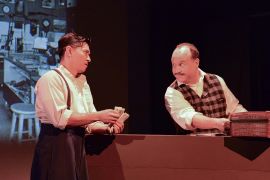 Though Kwong proves a competent director, it might have helped to have an outside voice on board to make savvy cuts. (An entire scene between Masao and a pawnbroker might have been replaced by a single line, “I hocked my sax and all the they’d give me for it was a measly seventy-five bucks,” and at least a few of the play’s nineteen characters could easily have been left on the cutting room floor.)
Though Kwong proves a competent director, it might have helped to have an outside voice on board to make savvy cuts. (An entire scene between Masao and a pawnbroker might have been replaced by a single line, “I hocked my sax and all the they’d give me for it was a measly seventy-five bucks,” and at least a few of the play’s nineteen characters could easily have been left on the cutting room floor.)
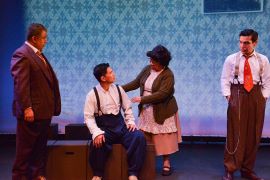 Not only that, but since Kwong’s design is barebones to the extreme (mostly boxes arranged and rearranged in various configurations), other than the fascinating projected backdrops that take us back in time and place (though what’s up with a TV store in the mid-1940s?) and costume designer Abel Avarado’s fabulous period wear, the show has a workshop look, and countless scene changes probably add ten minutes to its running time.
Not only that, but since Kwong’s design is barebones to the extreme (mostly boxes arranged and rearranged in various configurations), other than the fascinating projected backdrops that take us back in time and place (though what’s up with a TV store in the mid-1940s?) and costume designer Abel Avarado’s fabulous period wear, the show has a workshop look, and countless scene changes probably add ten minutes to its running time.
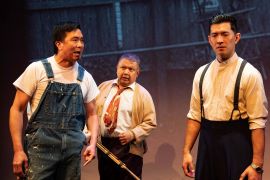 There can be no quibbling about Sasaki’s dynamic star turn as Masao, or an engaging Oliver’s spot-on vocals in Billie Holiday mode, or some terrific emoting by Watanabe and Garcia as two very different but equally loving fathers, or the work being done by Gentry, Golden, K., Martinez, Sakakibara, and a particularly appealing Cruz.
There can be no quibbling about Sasaki’s dynamic star turn as Masao, or an engaging Oliver’s spot-on vocals in Billie Holiday mode, or some terrific emoting by Watanabe and Garcia as two very different but equally loving fathers, or the work being done by Gentry, Golden, K., Martinez, Sakakibara, and a particularly appealing Cruz.
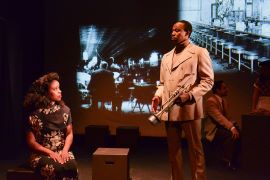 Jose Lopez’s lighting, Omar Gutierrez’s hair and makeup, John Paul Torres’s props, and Kwong’s sound design are all first-rate.
Jose Lopez’s lighting, Omar Gutierrez’s hair and makeup, John Paul Torres’s props, and Kwong’s sound design are all first-rate.
Corky Dominguez is assistant director. Daniel Corona is stage manager.
Masao And The Bronze Nightingale is produced by Emmanuel Deleague/CASA 0101 Theater in Association with the Japanese American National Museum. Kwong takes over for Watanabe beginning May 6.
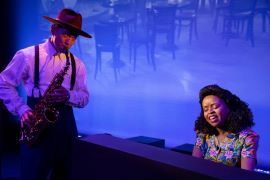 You’d think that ninety minutes would suffice to take a nine-page short story from page to stage, and certainly not twice that long a running time. Though Masao And The Bronze Nightingale is far from a no-go, it might actually be a must-see if astutely trimmed to a more audience-friendly length and given the full production design it deserves.
You’d think that ninety minutes would suffice to take a nine-page short story from page to stage, and certainly not twice that long a running time. Though Masao And The Bronze Nightingale is far from a no-go, it might actually be a must-see if astutely trimmed to a more audience-friendly length and given the full production design it deserves.
CASA 0101 Theatre, 2102 E. 1st Street, Los Angeles.
www.casa0101.org
–Steven Stanley
April 30, 2022
Photos: Daren Mooko
Tags: Casa 0101, Dan Kwong, Los Angeles Theater Review, Ruben Funkahuatl Guevara


 Since 2007, Steven Stanley's StageSceneLA.com has spotlighted the best in Southern California theater via reviews, interviews, and its annual StageSceneLA Scenies.
Since 2007, Steven Stanley's StageSceneLA.com has spotlighted the best in Southern California theater via reviews, interviews, and its annual StageSceneLA Scenies.







 COPYRIGHT 2025 STEVEN STANLEY :: DESIGN BY
COPYRIGHT 2025 STEVEN STANLEY :: DESIGN BY